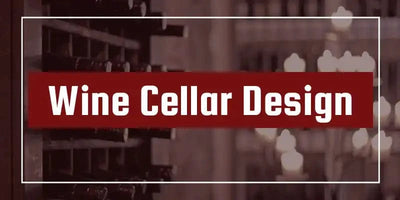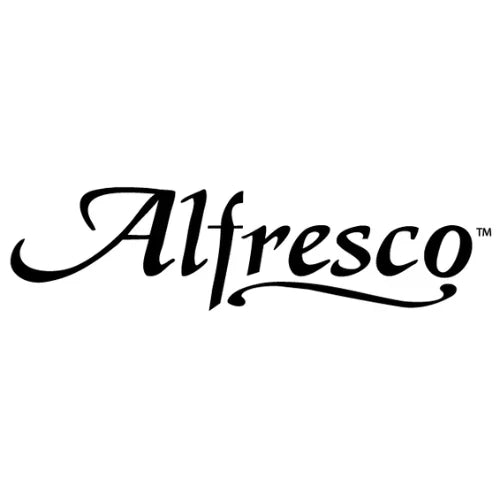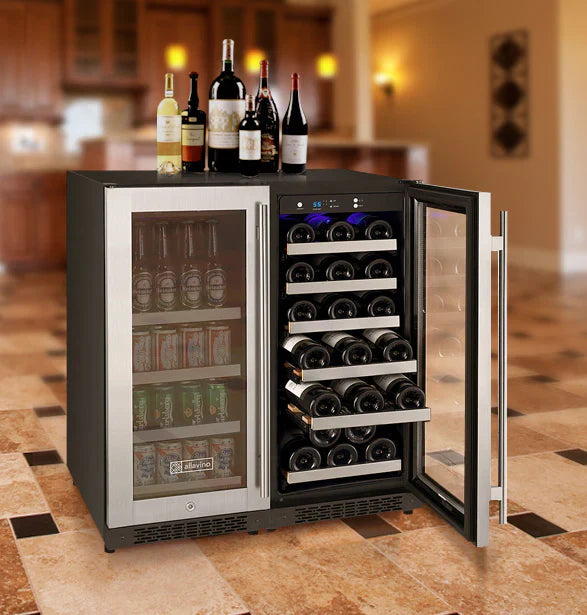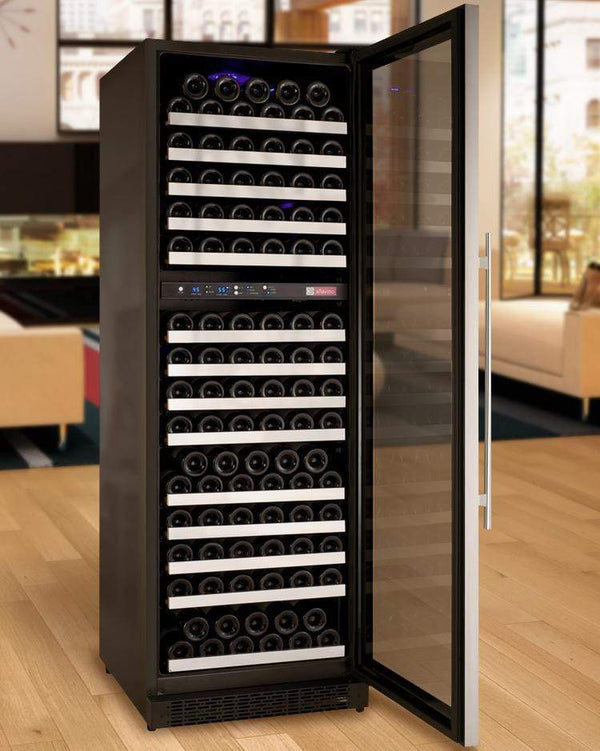Designing a Wine Cellar?
Let’s get it right.
Our specialists review your room layout, insulation, and heat load to recommend the correct cooling system for stable temperature and reliable climate control.
The Ultimate Buyer’s Guide to Choosing the Best Wine Fridge
The Complete Guide to Choosing the Right Wine Fridge
By Jim Hopper, Wine Cooling Expert
Whether you’re a seasoned collector or just starting your wine journey, storing your bottles in the right environment is essential to preserving their flavor and value. A wine fridge—also known as a wine cooler or wine refrigerator—is specifically designed to maintain the perfect conditions for your collection. This guide will help you confidently choose the best wine fridge for your needs, covering all the key factors, features, and installation tips.
New to wine storage? Start with our Wine Coolers 101 guide for an overview of the basics.
What Is a Wine Cooler?

A wine cooler is a specialized appliance made to store and chill wine bottles at precise temperatures and humidity levels. Unlike standard refrigerators, wine coolers keep a consistent temperature range between 45°F and 65°F (7°C to 18°C)—ideal for both storing and aging wine. They come in sizes from compact units for a few bottles to large models for hundreds, blending sophistication and functionality for any enthusiast.
Benefits of Owning a Wine Fridge
- Optimal Storage Conditions: Wine fridges control temperature, humidity, and light—three crucial factors for preserving wine quality.
- Convenience: Keep your reds, whites, and sparkling wines at their ideal serving temperature, ready for any occasion.
- Cost-Effective: Wine coolers are generally less expensive than building a wine cellar or buying a large wine cabinet, making them a practical choice for proper wine storage.
- Versatility: With various sizes, types, and styles, wine fridges fit seamlessly into your kitchen, dining room, home bar, or dedicated wine cellar.
Who Should Consider a Wine Fridge?

A wine fridge is a smart investment for:
- Wine enthusiasts and collectors who want to protect their collection.
- Home entertainers who want wine ready for guests.
- Anyone lacking a cool, dark, stable spot for wine storage.
- Those wanting to age wine or keep multiple varietals at their best serving temperatures.
Still unsure if a wine fridge is right for you? See our step-by-step buying guide for expert tips.
Key Factors to Consider When Buying a Wine Fridge
When shopping for a wine fridge, keep these important considerations in mind:
1. Capacity & Size
- Assess Your Collection: Consider how many bottles you want to store now and in the future. Choose a wine cooler slightly larger than your current needs to accommodate growth.
- Measure Your Space: Check the dimensions of your chosen spot and the wine cooler, including space for the door to open and proper ventilation.
Looking for top-rated models? See our Best Wine Fridges roundup.
2. Type of Wine Fridge
- Freestanding Wine Coolers: Can be placed anywhere with proper clearance for ventilation. Browse freestanding wine coolers.
- Built-in & Under Counter Wine Coolers: Fit seamlessly under counters or between cabinets for a sleek, integrated look. See built-in wine coolers and under counter options.
- Single Zone Wine Coolers: Maintain one consistent temperature—ideal if you mostly store one type of wine. Shop single zone models.
- Dual Zone Wine Coolers: Feature separate compartments with independent temperature controls, perfect for storing reds and whites at their respective ideal temperatures. Explore dual zone wine coolers or see our 14 Best Dual Zone Wine Coolers.
- Multi Zone Wine Coolers: Best for collectors with a wide variety of wines that require multiple temperature zones. View multi zone models.
Need inspiration? Check out the Top Wine Coolers in the Market.
3. Cooling Technology
- Compressor-Based: Powerful and effective for larger collections; similar to traditional refrigerators. They can be noisier but are better for fluctuating ambient temperatures.
- Thermoelectric: Quieter and more energy-efficient, best for smaller collections and stable ambient temperatures.
4. Temperature Control & Uniformity
- Precise Control: Fluctuations can spoil wine. Look for digital temperature settings accessible without opening the door.
- Zones: Dual or multi-zone models offer flexibility for different wine types.
- Uniformity: Consistent temperature throughout the fridge is crucial for long-term storage.
Learn more about the correct wine cooler temperature.
5. Humidity Management and Climate Classification
- Humidity Control: Proper humidity (ideally 50–70%) keeps corks from drying out and preserves labels. Some models have adjustable humidity controls or water bins.
- Climate Classification: If you plan to place your wine fridge in a garage, basement, or outbuilding, check for climate classification and look for features like a “winter system” that can warm as well as cool, ensuring your wine stays protected in any season.
6. Shelving, Storage, and Interior Design
- Adjustable or Removable Shelves: Allow for larger bottles (like Champagne or Burgundy).
- Materials: Wooden shelves reduce vibration and add elegance; wire racks are practical and common.
- Display Options: Some fridges offer display shelves or angled racks for showcasing labels.
- Personalization: Look for models with customizable shelf edges or doors to match your cabinetry.
7. Noise Level and Vibration
- Noise: Compressor models may generate more noise than thermoelectric models. If placing the fridge in a living area, look for a decibel rating below 40dB for quiet operation.
- Vibration: Excess vibration can disturb wine sediment and dull flavors. Choose models with vibration-dampening features to best protect your wine.
8. Energy Efficiency
-
Expectations: Wine coolers are not typically Energy Star rated, and most are less efficient than standard fridges due to their precise temperature needs. Some models are more efficient than others—check specifications and consider your usage patterns.
9. Lighting and Door Features
- LED Lighting: Offers clear visibility without emitting heat or UV rays.
- Tinted/UV-Protected Glass Doors: Protect wine from harmful light that can degrade flavor.
- Reversible Doors: Provide flexible installation options.
10. Security, Alarms, and Smart Features
- Integrated Locks: Keep your prized bottles secure from children or guests.
- Door Alarms: Alert you if the door is left open, helping maintain the ideal environment.
- Temperature Alarms: Notify you if the internal temperature strays from the set range.
- Smart Features: Some models offer app connectivity or remote temperature alerts for added convenience.
11. Automatic Defrost and Maintenance
- Automatic Defrost: Some fridges include this feature to minimize frost build-up, reducing maintenance needs.
- Ease of Cleaning: Removable shelves and easy-access interiors make upkeep simpler.
12. Brand Reputation, Warranty, and After-Sales Service
-
Reputation Matters: Opt for brands with strong customer reviews, reliable after-sales support, and comprehensive warranties. This ensures peace of mind and a better ownership experience, especially for higher-end or large-capacity units.
Get detailed product insights in our Allavino Wine Cooler Series Review and Best Summit Beverage & Wine Coolers.
Installation & Placement Tips

Proper installation helps your wine fridge perform at its best and last longer:
- Ventilation: Freestanding coolers need space around them (typically 2–3 inches) for airflow. Never build in a freestanding model. Built-in models vent from the front and can be installed flush with cabinetry.
- Location: Place your wine fridge away from direct sunlight, heat sources, and heavy vibrations.
- Level Surface: Ensure the fridge sits level for efficient operation and a proper door seal.
- Electrical Access: Make sure there’s a grounded outlet nearby.
For more, read our guide on built-in vs. freestanding installation.
Comparing Appliances
Not sure if a wine fridge, beverage cooler, or refrigerator is right for you? Read our guide on the differences between a wine cooler, beverage cooler, and refrigerator.
Popular Brands & What to Look For
Wine Coolers Empire offers a wide selection of top brands, each with unique strengths:
- Allavino Wine Coolers – known for advanced temperature control.
- Avanti Wine Coolers – a favorite for compact and affordable options.
- Cavavin Wine Coolers – stylish and reliable.
- Danby Wine Coolers – great for value and versatility.
- Liebherr Wine Coolers – premium German engineering.
- Summit Wine Coolers – excellent for built-in and specialty sizes.
- Smith & Hanks, Sunpentown, U-Line, Whynter, Lanbo – explore all for more options.
Expand Your Wine Storage
Already have a wine cellar or want to expand your setup? Discover our wine cellar cooling units and wine racks for flexible storage solutions.
Conclusion

A wine fridge is an excellent investment for anyone who values their wine collection. By considering your storage needs, available space, and the features most important to you, you can select a wine fridge that will keep your bottles in peak condition for years to come. Use this guide to make an informed decision and enjoy every glass at its best.
Need Help Choosing?
If you have questions or need personalized advice, contact us or call us at +1-888-407-7770. Our Sales Experts are ready to help you select the best wine cooler and design the ideal wine cabinet or cellar.
📚 Frequently Asked Questions (FAQs)
Are wine fridges worth it?
What is the lifespan of a wine fridge?
Why are wine fridges so expensive?
Are all wine fridges noisy?
Where is the best place to put a wine fridge?

Designing or Upgrading a Wine Cellar?
We got you! Here at Wine Coolers Empire, we will guide you in building your dream wine cellar.











